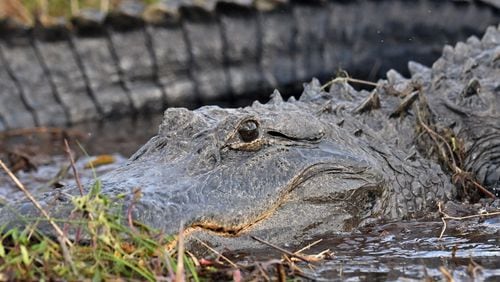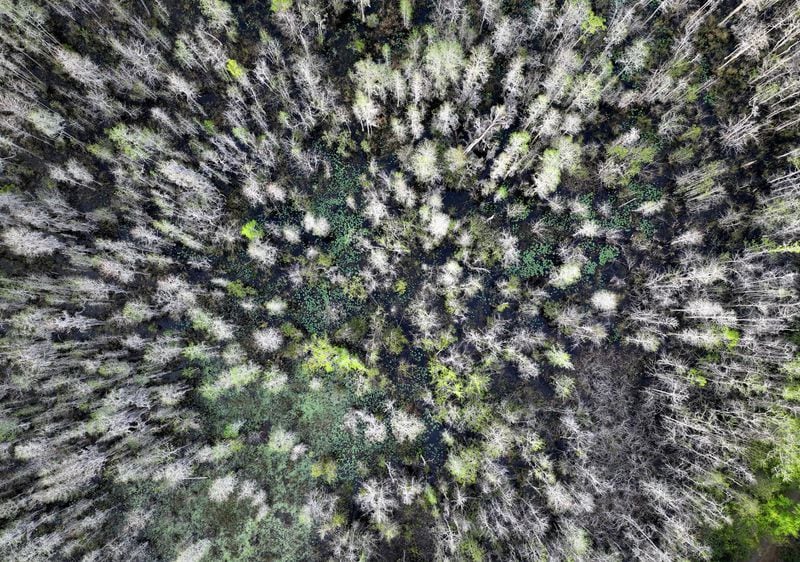After emotional debate, the Georgia House of Representatives passed a bill Tuesday that would pause permitting of new mines utilizing the same technology an Alabama company plans to use on the doorstep of the Okefenokee Swamp.
But the legislation contains language that concerns environmental groups and stops well short of the outright ban on future mining at the swamp’s edge some have called for.
The measure that passed Tuesday, Senate Bill 132, cleared the chamber by a wide margin, 167 to 4.
The bill would not prevent the Georgia Environmental Protection Division (EPD) from issuing permits to Alabama-based Twin Pines Minerals for the 582-acre mine the company wants to develop atop Trail Ridge, the line of ancient dunes that run along the east side of the swamp. Last month, EPD released draft permits permits for the controversial project, which has faced intense pushback for nearly five years.
But the legislation would prevent EPD from considering new permits for “dragline” mining for three years. Dragline mining is the same technique Twin Pines plans to use.
Twin Pines says the mine will not harm the swamp, and EPD’s experts have mostly agreed with their assessment. But environmental groups claim the project risks irreparable harm to the swamp and its wildlife. Outside scientists — including some with the federal government — have also questioned the conclusions of the company and EPD.
Credit: HYOSUB SHIN / AJC
Credit: HYOSUB SHIN / AJC
Rep. Debbie Buckner, D-Junction City, spoke begrudgingly in support of the bill.
Though Twin Pines has denied wrongdoing, the company was fined $20,000 earlier this year for violating state law when it drilled for sediment samples on the mine site. Buckner said she is still uncomfortable with what she called Twin Pines’ “terrible track record.” But with the clock ticking on the legislative session — Thursday is the final day for bills to clear both chambers — she said it was “the only option” to protect the Okefenokee and asked other members to support the bill.
“I urge you to vote for this, knowing that we are not getting the best, but we’re getting something good that will help us take care of the swamp,” Buckner said.
Rep. Lynn Smith, R-Newnan, the chair of the House Natural Resources and Environment Committee, also vouched for the bill.
Smith has been criticized for not allowing a vote in her committee on a separate measure — House Bill 71 — which would put all of Trail Ridge off limits to future mining. Proponents of the bill say it has bipartisan support from more than half of the House, enough to pass the chamber.
Smith briefly addressed those critiques. Though HB 71 received a committee hearing last year, Smith claimed it was not the right time for a vote because some bill signers asked to have their names withheld. She argued the three-year moratorium proposed by SB 132 was the right solution because it would “slow things down to give everyone a chance to research and look into what’s going on.”
In a statement on X, formerly known as Twitter, House Speaker John Burns also cheered SB 132′s passage, saying the pause would protect the environment and private property rights.
Still, environmentalists have concerns about certain language in SB 132. The bill says the moratorium “shall not prevent the modification of permits already issued by [EPD] or the granting or modification of permit applications originally submitted to the division ... on or before June 30, 2024.”
Alice Keyes, the vice president of coastal conservation for the nonprofit One Hundred Miles, said that language creates a loophole that could allow Twin Pines to expand by simply amending their state permits. The company owns roughly 8,000 acres of land near the Okefenokee and has signaled it plans to expand beyond its proposed 582-acre “demonstration” mine.
Keyes said the bill “falls far short of protecting the Wild Heart of Georgia,” as the Okefenokee is sometimes called.
She also called on the public to provide feedback to EPD on Twin Pines’ draft permits before the comment period closes April 9. Submissions can be sent to EPD at TwinPines.Comment@dnr.ga.gov.
With just one day left in the legislative session, SB 132 now heads to the Georgia Senate, where its odds of passing are unclear.
About the Author









